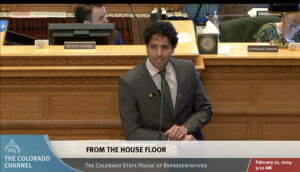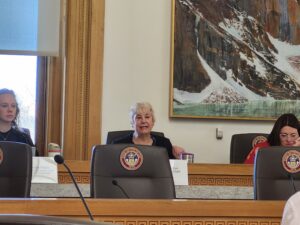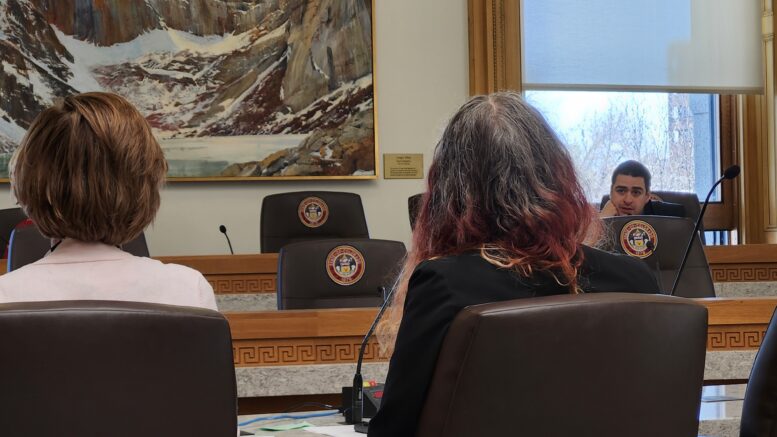Two Colorado House Democrats pushed a bill through a committee Thursday to streamline the permitting of carbon-capture operations — but not before tacking on an amendment adding a far-reaching “cumulative impacts” definition that cost it support of Republicans.
The 9-4 vote to pass House Bill 1346 out of the House Energy & Environment Committee marked a sharp turn from two weeks ago, when Democrats expressed skepticism about the bill despite its backing from several state agencies, including the Colorado Energy Office. Sponsoring Reps. Brianna Titone of Arvada and Karen McCormick of Longmont pulled the bill back at the time to try to find consensus with worried environmentalists, and what returned Thursday featured several changes and a different set of backers and detractors.
The bill still would give the Colorado Energy and Carbon Management Commission the ability, pending U.S. Environmental Protection Agency approval, to license and regulate wells in which carbon is pumped into underground pore space for permanent storage. It also would define ownership of the pore space — granting it to the holder of the surface rights above it — and allow pooling orders when there is agreement from owners of 75% of the pore space.
Carbon capture and sequestration is a necessary tool for the state to meet its emissions-reduction goals, and it will be especially helpful in cleaning hard-to-decarbonize industries like cement and steel plants, CEO Executive Director Will Toor has said. However, some environmental advocates have objected, fearing the possibility of leakage from underground pipes and saying the state should focus on ending oil and gas production rather than on capturing carbon after it’s been brought to the surface.
Big change to bill on carbon capture
An amendment added Thursday by Titone and McCormick removed CECMC oversight of direct air capture until the CEO has studied the nascent technology this fall to see if it can help with emissions reduction. It also requires CECMC to consult with local governments that control the surface land over the carbon storage area.

Colorado state Rep. Manny Rutinel speaks on the House floor earlier this legislative session.
But the major change came in another amendment from Rep. Manny Rutinel, D-Commerce City, that would define “cumulative impacts” of carbon capture and storage on a nearby area and require officials to consider that when deciding whether to issue well permits. Not only would the new definition apply to carbon-capture activities, but it would apply to all operations regulated by the CECMC, including oil-and-gas drilling.
Because of the proposed change, CECMC officials already have delayed a rulemaking that was scheduled for later this month in which they were planning to define “cumulative impacts” after a year of stakeholding on the issue. Rutinel’s amendment, written largely by environmental groups, would push that rulemaking back to September and refocus it on the implementation of the legislatively ordered definition rather than on crafting of the definition, which CECMC first proposed in January.
How “cumulative impacts” is defined
It defines “cumulative impacts” as the effects on public health and the environment, including impacts to air quality, water quality, climate, noise, odor, wildlife and biological resources caused by the incremental impacts of a proposed new or amended operation. The amendment specifies the CECMC consider the effects of these impacts in addition to impacts “from other past, present and reasonably foreseeable future development of any type on the impacted area or on a disproportionately impacted community.”
“I know this is a sensitive topic for a lot of environmental groups, particularly environmental justice groups,” Rutinel said.
Several aspects of the definition are likely to prove troubling to companies that would be regulated by it. The effects that must be considered are not limited to direct effects from the new activity, and the requirement to consider “reasonably foreseeable future development” allows for a lot of leeway to limit permit applicants for projects not even on the table. Plus, the “impacted area,” defined later in the amendment, is not limited to area that is a specific distance from permit seekers but includes “areas in which operations regulated by the commission have the potential to contribute to cumulative impacts.”
Rep. Gabe Evans, R-Fort Lupton, objected most loudy to the amendment, saying it upends a year of work and consensus-building done by the CECMC and forces upon it a definition developed after public testimony already had ceased in the committee. While the bill still offers opportunities for free-market climate solutions and creation of jobs, the new definition is overly regulatory and its offering rips the rug out from under the experts who had been trying to craft it, he said.
Defending changes, votes on carbon-capture bill
“I feel like we keep moving the goal for folks to hit as we keep trying to improve our climate,” Evans said. “And I think that has a negative impact on a lot of other things that potentially detract from our work on the environment.”

Colorado state Rep. Cathy Kipp discusses her vote on a carbon-capture bill in a committee Thursday.
Rep. Cathy Kipp, the committee chairwoman and a Fort Collins Democrat, said environmental groups have continued to ask her to kill the bill even with the amendment. She said before voting with other committee Democrats to pass HB 1346 over GOP objections that without the bill, Colorado would have no say over the approval of Class VI injection wells that pump carbon underground, as those now are regulated by the EPA.
And Titone, who blessed Rutinel’s amendment, emphasized that the bill still will make Colorado a more attractive place for companies hoping to invest in carbon capture and sequestration, even as it also gives state officials more control over the environment.
“There’s a lot of people who are still really nervous about carbon sequestration,” Titone told the committee. “The fact of the matter is that we’ve gotten ourselves into a situation where we’ve got to do something about the rising CO2 levels. This is a tool that can do something about that.”
HB 1346 heads next to debate on the House floor.
